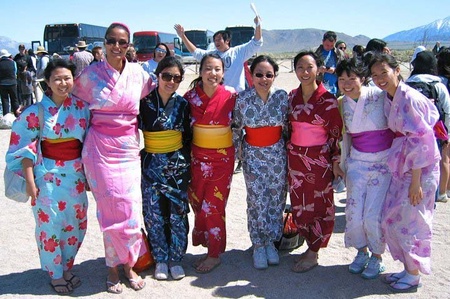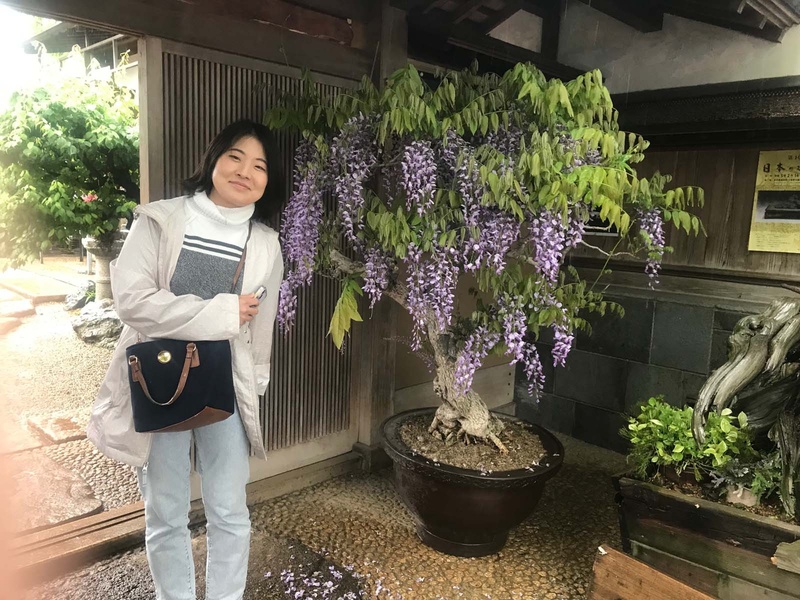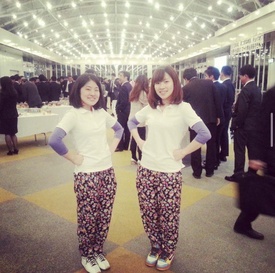New Nisei-ness
I was born and raised in Japan and moved to America, so I am what they call a "new first generation." And my children are "new second generation." However, even if we say "new second generation," their level of adaptation to Japanese language and culture varies. Whether they attended a Japanese language school or not, whether their parents spoke Japanese thoroughly at home or not, whether they attended a Japanese school during the summer vacation or not, their parents' educational philosophy, friendships, environment, experiences, and their own inclinations make a big difference in the "degree of Japaneseness."
Aoyama Yumi works in public relations for a non-profit organization in Los Angeles. When I first interviewed her online for an article in a Japanese magazine, I felt that although her Japanese was perfect, she had a certain "new second generation" vibe. There are cases where people who were born and raised in Japan come to America to study and continue working there. However, the vibe that Aoyama exuded was not that of a "former Japanese student studying abroad." This may just be the intuition of a parent who has raised new second generation children, but I felt that Aoyama had something in common with my own children.
He told me that he was born and raised in America because of his father's work, graduated from an American university and got a job at a Japanese company, spent a few years in Japan, then returned to America and started working in Los Angeles due to "differences in values." My hunch was right. I immediately asked Aoyama if he would be interviewed by a publication focusing on Japanese identity, and he readily agreed.
Aoyama's parents came to the US in the 1980s, and her eldest daughter, Yumi, was born in the 1990s. "My father was seconded to the US to support a subsidiary, so we planned to return to Japan eventually (and ended up settling in the US permanently). Our house was in a Jewish community in the suburbs of Los Angeles, and there were very few Japanese or Japanese-Americans around. But knowing that we would return to Japan eventually, I attended Asahi Gakuen Santa Monica, a supplementary school, every weekend until I graduated from high school. At home, the rule was 'Japanese only'. Didn't you hate going to supplementary school on Saturdays? At supplementary school, I exchanged J-Pop CDs with my friends and talked about Japanese dramas and variety shows, so it wasn't a struggle to continue studying Japanese at all."
Aoyama enjoyed attending supplementary school, learned Japanese at home, and even attended trial classes in Japan every year until junior high school. Based on these experiences, she says, "I was able to express what I wanted to say in Japanese more than in English. In fact, it was only after I entered university that I was able to speak English freely." She confides, "I thought I was more Japanese (than American)."
I want to live in Japan at least once
After graduating from high school, he considered going to a university in Japan, but he ended up going to UCLA (University of California, Los Angeles) and majoring in communications. He took the Heritage Japanese class and was active in the Japanese American Student Association. His desire to live in Japan at least once grew, and he received a job offer from a Japanese company at the Boston Career Forum he attended six months before graduation, and began his life in Tokyo.

"My job was sales support, and I also traveled to Singapore and Hong Kong where I served as an interpreter. As an interpreter, I was able to put my language skills to good use and it was a valuable experience," says Aoyama, but he recalls that within his first year at the company, he was already feeling like he wanted to "go back to America."
"Different values bothered me. There is sometimes a tendency for women to try to one-up others, and I felt that my self-esteem was hurt when I was not able to be myself. I also couldn't get used to the difference between what Japanese people really think and what they say on the surface. Even if someone is badmouthing someone over drinks, the next day they will just go along with it as if nothing had happened. I wondered if this was not a fundamental solution, and what is normal in Japanese society was not normal for me. The thing that shocked me the most was that I was not allowed to go on a business trip to a certain country just because I was a woman."
Aoyama understood that this was done to protect women from danger, but it seemed to her that women were not given the same opportunities as men in Japan. Furthermore, she said that while men were severely scolded by their superiors, female employees were rarely scolded. "At the time, I thought that this was because women were not expected to do well."
Furthermore, Aoyama, who speaks fluent Japanese and has a Japanese face and name, said that he did not receive the support he needed as a foreign employee. "It was my first time living in Japan, so there were a lot of things I didn't know, like how to open a bank account. I later found out that support for setting up life in Japan was provided to new foreign employees."
Although she had wanted to go home after her first year, she learned the saying "it takes three years to get used to something," and, although she had difficulty adapting to Japanese corporate culture, she was "blessed by the people around me," so after four and a half years of work she returned to the U.S. "I realized that I was more American inside than I had thought."
So, has she been able to regain her sense of self since returning to America? "In Japan, I felt like I was tightly bound by rules about how I had to be. But now I don't have to worry about that. When I first came back, I felt relieved when I was told that I didn't have to do the Japanese-style groundwork at work and that 'we can just discuss it in meetings.' It was a relief."
Even if you think you are Japanese, you won't know the truth until you actually live and work in Japan. As I listened to Aoyama's story, I thought about the future of my daughter, a college student who was born and raised in the United States.
© 2023 Keiko Fukuda







